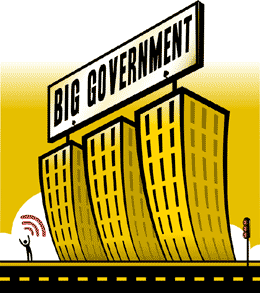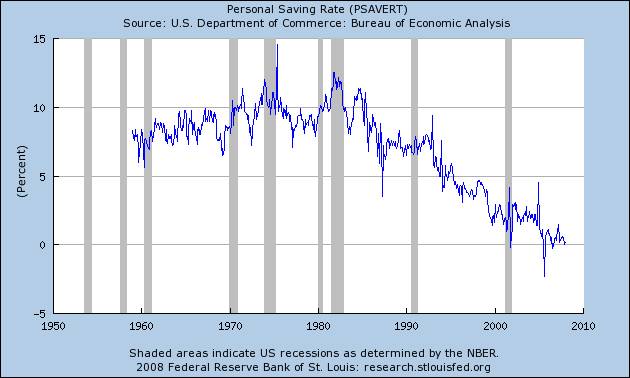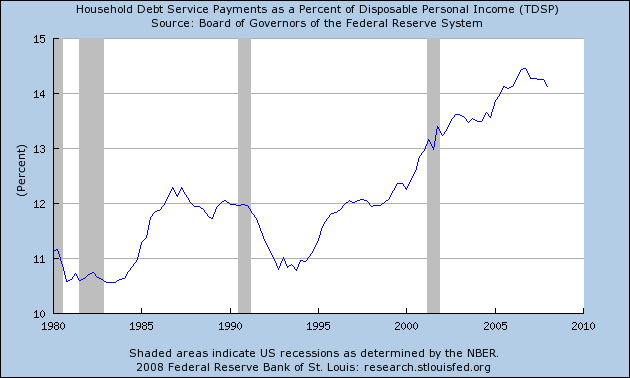Big Government shouldn’t be confused with Government proper. Government proper, limited in its power and scope to only those tasks which legitimately protect life, liberty, and property from fraud and criminality, is not Big Government. It is the foundation of a free civilization.

Here are some definitions of Big Government from a few online dictionaries.
“Government perceived as being excessively big-spending and attempting to control too many aspects of people’s lives.” MSN Encarta
“Government that seems to have too much control over people’s lives.” Macmillan
“Any government wielding excessive control over its citizens or interfering with their lives.” Dictionary.com
You see the themes – control, interference, wasteful, big-spending.
That’s true, of course, but we’d like to be a little more specific and thought-provoking in our definition.
Big Government, in its most raw form, is a group of individuals that through coercion turns human beings into either beasts of burden or perpetual children.
It is that group which preaches entitlement over responsibility, dependency over self-sufficiency. It purports that people are incapable of caring for themselves through free and voluntary choices, and therefore must be coerced into “doing the right thing.” It prevents human beings from being fully actualized, keeps them in a form of subjection and – in its most extreme form – slavery.
Does it do this deliberately and willfully? Not in the beginning. Isabel Paterson, in her book The God of the Machine, said:
“Most of the harm in the world is done by good people, and not by accident, lapse, or omission. It is the result of their deliberate actions, long persevered in, which they hold to be motivated by high ideals toward virtuous ends… …[W]hen millions are slaughtered, when torture is practiced, starvation enforced, oppression made a policy, as at present over a large part of the world, and as it has often been in the past, it must be at the behest of very many good people, and even by their direct action, for what they consider a worthy object.”
Even the alleviation of suffering, so long as it is done through plundering third parties, will result in more total suffering induced than ever relieved. The total amount of suffering in the world cannot be reduced by forcing one group of human beings to relieve it in the way the tyrant desires. The tyrant’s coercion makes more of mankind miserable, turns them away from productive endeavors. In its extreme forms, Big Government paradoxically kills innocents in order to save lives.
Seen in this way, Big Government can either be a Tyrant or a Nanny, or a combination of both. Either it enslaves you and coercively makes you work on its behalf, or it “protects” you from yourself, restricting your freedom while promising to care for your every need, in exchange for your agreement to keep it in power.
Either way, it treats you as either an animal to be burdened, or a scolded child to be suckled forever at its teat.
How you are treated often depends on whether or not you are willing to keep the ruling cadre in power. If you do, you may lose your freedom but win the privilege of being coddled. If you don’t, you may lose your freedom and be burdened.
So Big Government divides people into two groups: one group is the animals burdened with the task of producing the mothers milk forever; the other is that group which forever – or so it’s promised – drinks the mothers milk.
Now, in pointing this out, we’re not talking about any specific group that is favored by government and eats from the labor of others, we’re talking about all such group, from bailed out banks and companies, to subsidized farmers, to protected unions, to groups that benefit from tariffs, to the ever-growing unproductive government bureaucracy; in short, any form of corporate or public dependency program.
One of the central features of Big Government is that it encourages bad behavior in order to remain in power. It bails out those who have made bad decisions in order to gain their support.
The individuals that comprise Big Government, of course, play god, determining which group of human beings will be the beasts of burden, and which will be the bailed out, dependent children.
Over time, people learn that it does not pay to behave responsibly. In fact, the consequences for poor judgment will be so lessened as to have no moral authority over behavior. People learn that they can live life however irresponsibly they want and some one else will be forced to pick up the tab … that is, until there’s no one left with any money or productive resources.
At that point, the system collapses soviet-style. The beasts of burden decide that it’s easier to be suckled infants and then there are no longer enough producers to support the dependents.
One interesting phenomenon that we have noticed over the past decades is how Americans have behaved regarding debt and savings, and how the past decisions they made are now affecting them.
Look at what has happened in the U.S. over the last few decades.
This first graph shows the U.S. Savings rate (what percentage of their incomes Americans saved) over the past 50 years.
Notice that, for whatever reason, over the last 30 years people have been putting less and less money away for a rainy day.
Now, look at this graph of household debt as a percentage of disposable income over the last 30 years.
Despite saving less money, people are using more borrowed money to support their lifestyles, especially over the last decade.
Low savings rate + high and increasing debt load = people living beyond their means
At some point, the gig is up.
Now, look at this graph of the number of food stamp recipients over the last decade. In the decades prior to 2000, the number of food-stamp recipients had been trending down.
So here’s the questions:
Are these events merely correlated or is there an element of causation? That is, do government bailout promises encourage people to not take responsibility for their own lives, to prepare for “unforeseen” – yet predictable – misfortunes in the future?
Understand that we’re not arguing for or against this particular social program, just merely asking questions about whether or not Government Dependency Programs create Moral Hazard.
What do you think? Do government handout programs enable bad behavior?
Does the knowledge that someone will be there to give you food, coupled with the knowledge that the government has the capacity to forever force someone else to pay for your livelihood, make you take less responsibility for your own well being, live on borrowed money, not save for a rainy day?
By asking these questions, of course we’re not advocating for letting the hungry starve. We advocate for the support of voluntary charities, and lots of it, and we believe that each of us has a personal responsibility to responsibly care for the poor among us in ways that do not create dependency and thereby rob recipients of their dignity.
If you reward bad behavior, you’ll get more of it. If you punish responsible behavior, you’ll get less of it.
Big Government must be opposed. If we don’t oppose it immediately, over time in its most extreme forms it reduces people to animals or infants.
As Cato’s Letter #38 taught:
“What is government, but a trust … which ought to be bounded with many and strong restraints, because power renders men wanton, insolent to others, and fond of themselves.”
Sign up for our RSS feed and become a fan of our Facebook Page. We’ll continually send you information about how you can help keep government in its place.
Then, Join DownsizeDC.org and participate in it’s campaigns. It takes less than five minutes per day, and you just participate in the campaigns you like. In our opinion, it is the best project around for reducing the size and scope of Big Government.
originally published May 21, 2010.





September 4th, 2009 at 4:28 pm
“When the people fear their government, there is tyranny, but when the government fears the people, there is liberty.” – Thomas Jefferson
September 4th, 2009 at 6:44 pm
Thanks for the great explaination. For more on “Big Government” see the following from James Madison:
http://www.constitution.org/fed/federa45.htm
September 4th, 2009 at 7:45 pm
“Government big enough to supply everything you need is big enough to take everything you have … The course of history shows that as a government grows, liberty decreases.
September 5th, 2009 at 4:30 am
I’ve read the the first portion and to tell you the truth I don’t need to read the rest. This is gold, I would pay for this if it were on sale. But I bet the public wouldn’t want any stock in it. Oh well I refuse to be Nannied.
September 5th, 2009 at 8:11 am
As a registered Libertarian, learn more at lp.org, I think that big government is any government run by Democrats or Republicans. The Liberatarians want to abolish corporate and social welfare and reduce government spending by a minimum of 50%.
September 5th, 2009 at 12:22 pm
big government is an oligarchy. The only other choice is a Republic, which we haven’t really had for about 150 years at least.
September 6th, 2009 at 8:51 am
Government regulates Society for the benefit of Society, Big Government dominates Society for it’s own benefit and self perpetuation.
September 6th, 2009 at 3:52 pm
Democrats want the government to solve all their problems.
Rebpublicans want to legislate morality.
I just want the government to leave me alone. I’m a Libertarain.
September 10th, 2009 at 12:00 am
The reason I will not register Libertarian is that if and when the Libertarian Party gets large enough and strong enough to actually control what happens in Washington, it will be run by party bosses and begin to use its’ members just as the Two Parties do. It will become just another political party.
I am a Libertarian in ideology; however, I will never again give my allegiance to any political party. I’ve been burned once–never again.
September 10th, 2009 at 8:40 am
I don’t think that this a major concern right now since the Libertarian Party’s budget this year is less than $2 million .
September 19th, 2009 at 9:41 am
Excessive Taxes + Invasive, Micromanaging Policies = BIG GOVERNMENT.
April 17th, 2010 at 3:34 am
I totally love this article, What is Big Government? | Small Business Against Big Government couldnt explain it any better, absolutely going to need to add this to my bookmarks.
September 13th, 2010 at 8:47 am
I just saw Thomas Williams’ praise of Food Stamps. It brought to mind the occasion that my wife and I were grocery shopping buying hamburger meat, mac & cheese, as well as a few other things we could afford on the meager salary that Albany Medical College paid faculty. When we got i line to check out, we found ourselves behind a pair of very obese people (? husband & wife)with a pair of baskets loaded with steaks and lobsters, as well as other pricey groceries. You guessed it. They paid for it all with food stamps. There is something wrong here.